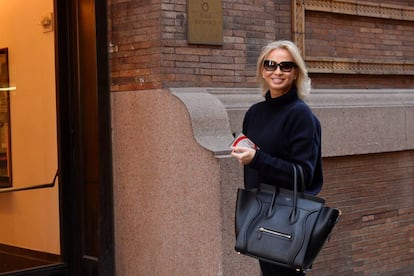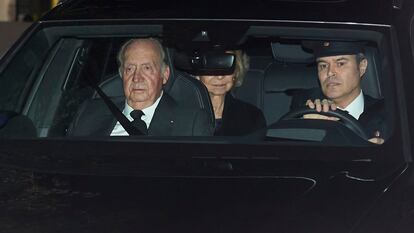Spanish judge asks Swiss prosecutor for information on alleged donation to friend of former King Juan Carlos
Documents discovered in Geneva related to a multi-million transfer received by Corinna Larsen could see a legal probe reopened in Spain


A High Court judge in Spain has requested new information from a public prosecutor in Switzerland over an investigation the latter is carrying out into a donation received by Corinna Larsen, a friend of Spain’s former king, Juan Carlos I. Swiss state attorney Yves Bertossa is probing an alleged money-laundering offense involving Larsen, in relation to the possible payment of illegal commissions connected to a Spanish project to build a high-speed AVE train link in Saudi Arabia.
Manuel García Castellón, the Spanish High Court judge in question, had previously opened a case into recordings of Corinna Larsen, in which she is heard stating that the emeritus king – who abdicated from the Spanish throne in 2014 – held undeclared bank accounts in Switzerland. That case was shelved in 2018 due to a lack of evidence.

The Swiss prosecutor, meanwhile, has discovered an alleged multi-million-euro donation made to Larsen in 2012 from a Swiss bank account, as EL PAÍS revealed earlier this week. Larsen claims that the funds were a donation made by Juan Carlos to her and her son.
Judicial sources have told EL PAÍS that the information that the Spanish judge is waiting for could see the shelved probe reopened.
The relationship between Corinna Larsen and Spain’s king emeritus came into the public spotlight as a result of the 2012 accident that Juan Carlos suffered in Botswana, where they were both on a hunting safari. The incident damaged the monarch’s reputation and was partially behind his surprise decision to abdicate in 2014.
Larsen, a Monaco-based businesswoman, who continues to use her German ex-husband’s aristocratic title, zu Sayn-Wittgenstein, made headlines in 2018 when recordings emerged in which she claimed she had been used as a front to conceal some of Juan Carlos’ wealth.
The recording was one of many made by a former police commissioner named José Manuel Villarejo, who is at the heart of a series of judicial investigations into 20 years’ worth of wiretaps and other invasions of privacy against scores of politicians, business people, judges and journalists in Spain. Villarejo is currently in prison awaiting trial.
The Spanish prosecutor’s request for information comes after its corruption branch began investigating alleged irregularities relating to the Mecca high-speed rail project
Judge García Castellón has requested the documents that detail the discoveries made by the Swiss prosecutor, and which were communicated to the Spanish High Court in July last year. Bertossa informed the judge of documents located during searches of the offices of fund manager Arturo Fasana and the lawyer Dante Canonica. These included an account at the private Genevan bank Mirabaud from which around €65 million was transferred in 2012 from an account in the Bahamas – which is a tax haven – to an account belonging to Larsen.
The Mirabaud account, which was managed by Fasana, was in the name of a now-defunct Panamanian foundation called Lucum, and received an alleged donation of $100 million transferred by the Finance Ministry in Saudi Arabia. At that time, the Saudi king was Abdullah bin Abdulaziz Al Saud, who died in 2015.
The Spanish prosecutor’s request for information comes after its corruption branch began investigating alleged irregularities relating to the Mecca high-speed rail project. Spanish prosecutor Luis Pastor took a statement in London from Larsen, who denied having anything to do with the AVE contracts and stated that she had only had knowledge of alleged commissions “through third parties.”
As part of the same investigation, prosecutors have interviewed the Iranian intermediary Shapari Azam Zanganeh, the third wife of Saudi magnate Adnan Khashoggi, who died in 2017. For many years the couple were regulars in jet-set circles in Marbella, in southern Spain.
On October 29, Bertossa traveled to Madrid and met with García Castellón as well as public prosecutors Luis Pastor, Alejandro Lujón, Miguel Serrano and Ignacio Stampa. The latter two attorneys were investigating the recordings of Larsen speaking about the king’s business affairs, until the case was shelved by a judge due to lack of evidence and the fact that the king enjoyed immunity while he was monarch.
Political calls for investigation
Carlos E. Cué / Inés Santaeulalia
Left-wing party Unidas Podemos on Thursday demanded an investigative commission covering the “alleged corrupt activities of the king Juan Carlos,” after news broke this week that the Swiss public prosecutor is investigating a multi-million-euro donation received by the former monarch’s friend, Corinna Larsen, and that was transferred from a Swiss bank account linked to a Panamanian foundation.
Unidas Podemos is currently the partner of the Socialist Party (PSOE) in a coalition government. The party, which is led by politician Pablo Iglesias, is calling for the probe as a group rather than from the coalition itself. The political consequences of the move are unpredictable, given that, for now, the government itself has kept quiet about the news of the Swiss investigations. Sources from the executive insisted that they have not yet taken a position on what is a very delicate matter. The Royal Household has also opted not to comment on Unidas Podemos’s parliamentary initiative.
PSOE chiefs pointed out that attorneys from Spain’s lower house of parliament, the Congress of Deputies, have on a number of occasions rejected an investigation into the economic activities of emeritus King Juan Carlos, on the basis that he enjoyed complete immunity while he was head of state. The PSOE believes that the attorneys will now state the same thing, meaning that the commission sought by Unidas Podemos is highly unlikely to go forward. To make this happen, the PSOE will have to rely on support from the conservative Popular Party (PP) when the request for a probe reaches the speaker’s committee in Congress.
English version by Simon Hunter.
Tu suscripción se está usando en otro dispositivo
¿Quieres añadir otro usuario a tu suscripción?
Si continúas leyendo en este dispositivo, no se podrá leer en el otro.
FlechaTu suscripción se está usando en otro dispositivo y solo puedes acceder a EL PAÍS desde un dispositivo a la vez.
Si quieres compartir tu cuenta, cambia tu suscripción a la modalidad Premium, así podrás añadir otro usuario. Cada uno accederá con su propia cuenta de email, lo que os permitirá personalizar vuestra experiencia en EL PAÍS.
¿Tienes una suscripción de empresa? Accede aquí para contratar más cuentas.
En el caso de no saber quién está usando tu cuenta, te recomendamos cambiar tu contraseña aquí.
Si decides continuar compartiendo tu cuenta, este mensaje se mostrará en tu dispositivo y en el de la otra persona que está usando tu cuenta de forma indefinida, afectando a tu experiencia de lectura. Puedes consultar aquí los términos y condiciones de la suscripción digital.








































